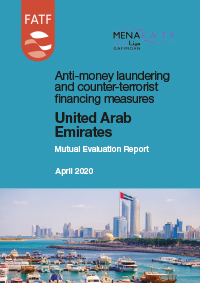| | | The Financial Action Task Force (FATF) and the Middle East and North Africa Financial Action Task Force (MENAFATF) assessed The UAEs anti-money laundering and counter terrorist financing (AML/CFT) system. The report is a comprehensive review of the effectiveness of the UAE’s measures and their compliance with the FATF Recommendations. This includes an assessment of its actions to address the risks emanating from designated terrorists or terrorist organisations. The report does not address the justification that led to the designation of an entity as a terrorist or terrorist group or organisation.
|
Paris, 30 April 2020 – The United Arab Emirates recently strengthened its legal framework to fight money laundering and terrorist financing but, as a major global financial centre and trading hub, it must take urgent action to effectively stop the criminal financial flows that it attracts.
The UAE’s understanding of the risks it faces from money laundering, terrorist financing and funding of weapons of mass destruction is still emerging, following their recent national risk assessment. The risks are significant, and result from the UAE’s extensive financial, economic, corporate and trade activities, including as a global leader in oil, diamond and gold exports. The UAE's strategic geographical location between continents, in proximity to conflict zones and its own jurisdictional complexity of 7 Emirates, 2 financial free zones and 29 commercial free zones further increase the UAE's risk of attracting funds with links to crime and terror
In recent years, the UAE has significantly strengthened relevant laws and regulations and has put in place a range of committees to improve national coordination and cooperation. While the country needs to swiftly address a number of remaining issues, the elements of an effective framework to detect and prevent criminals and terrorists from misusing the financial system are mostly in place. However, this framework is relatively new and it has not yet been able to demonstrate the expected results.
With 39 different company registries, which helped the UAE grow its various free zones, the misuse of legal persons is a real risk. The UAE also faces a significant risk of exposure to proceeds of crimes conducted abroad, but authorities do not make sufficient use of formal international legal assistance processes to pursue money laundering or the financing of terrorism and proliferation, although they demonstrated better capacity in using informal processes.
Authorities have access to a broad range of financial information in their investigation of terrorist financing, fraud and other offences. The UAE has achieved positive results in investigating and prosecuting the financing of terrorism, but its limited number of money laundering prosecutions and convictions, particularly in Dubai, are a concern given the country’s risk profile. Authorities do not fully exploit financial intelligence to go after money laundering or trace the proceeds of crime. Improvements to the Financial Intelligence Unit’s role and capacity are positive but were too recent to demonstrate better operational outcomes.
The UAE has extremely large and diverse financial and non-financial sectors and the report identified issues in the supervision of some of the higher risk sectors, such as banks, the Dubai property market, dealers in gold and other precious metals and stones and hawaladars.
The UAE is a major international and regional financial centre and trading hub which attracts both legitimate financial and business activities as well as financial flows with links to crime and terrorism. The country must urgently deepen its understanding of the risks it faces at national and individual Emirate-level and take action to strengthen the effectiveness of its measures to stop money laundering, terrorist financing and proliferation financing.
The FATF adopted this report at its February 2020 Plenary meeting.



 Twitter
Twitter
 Facebook
Facebook
 Instagram
Instagram
 Linkedin
Linkedin
